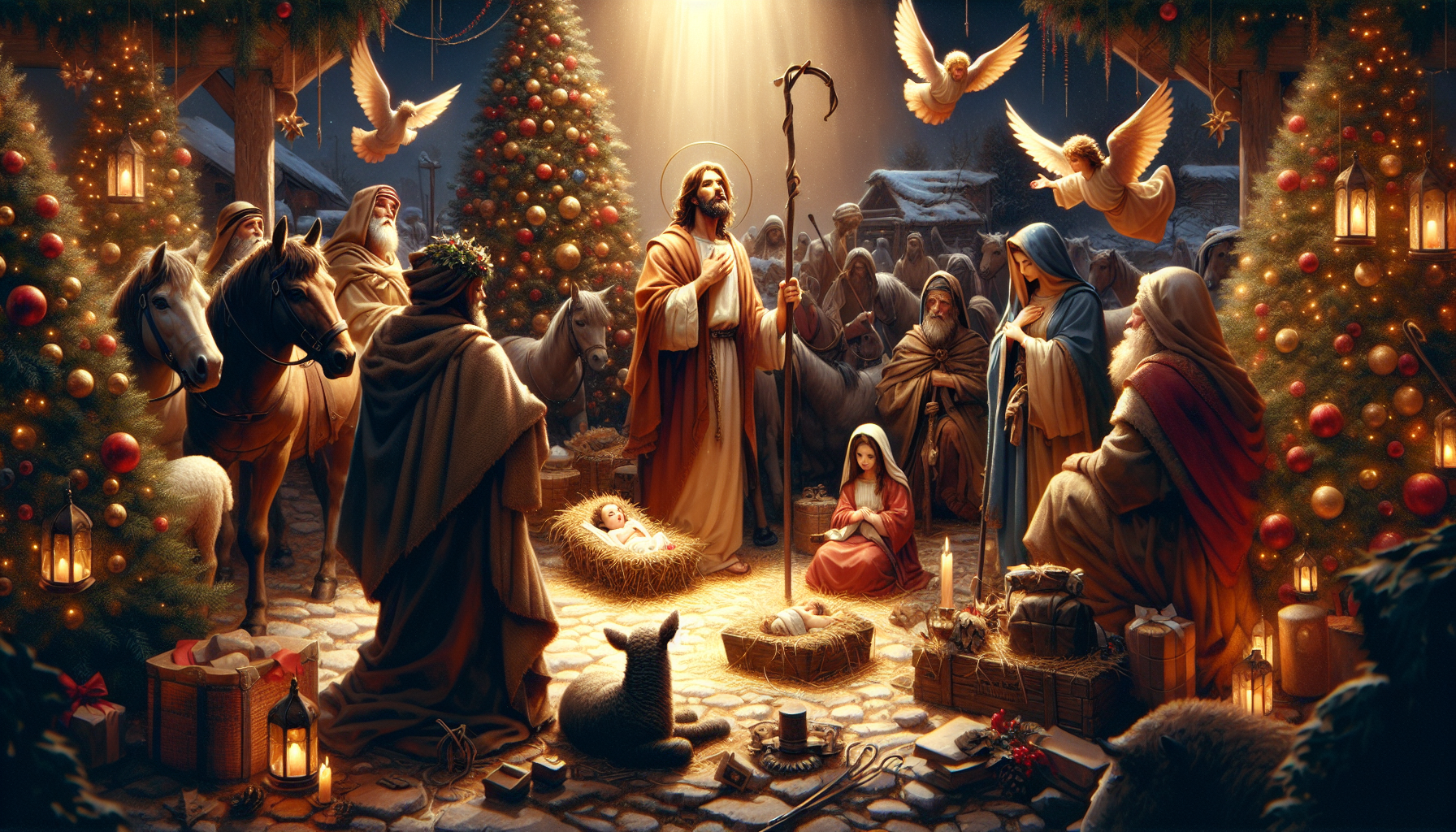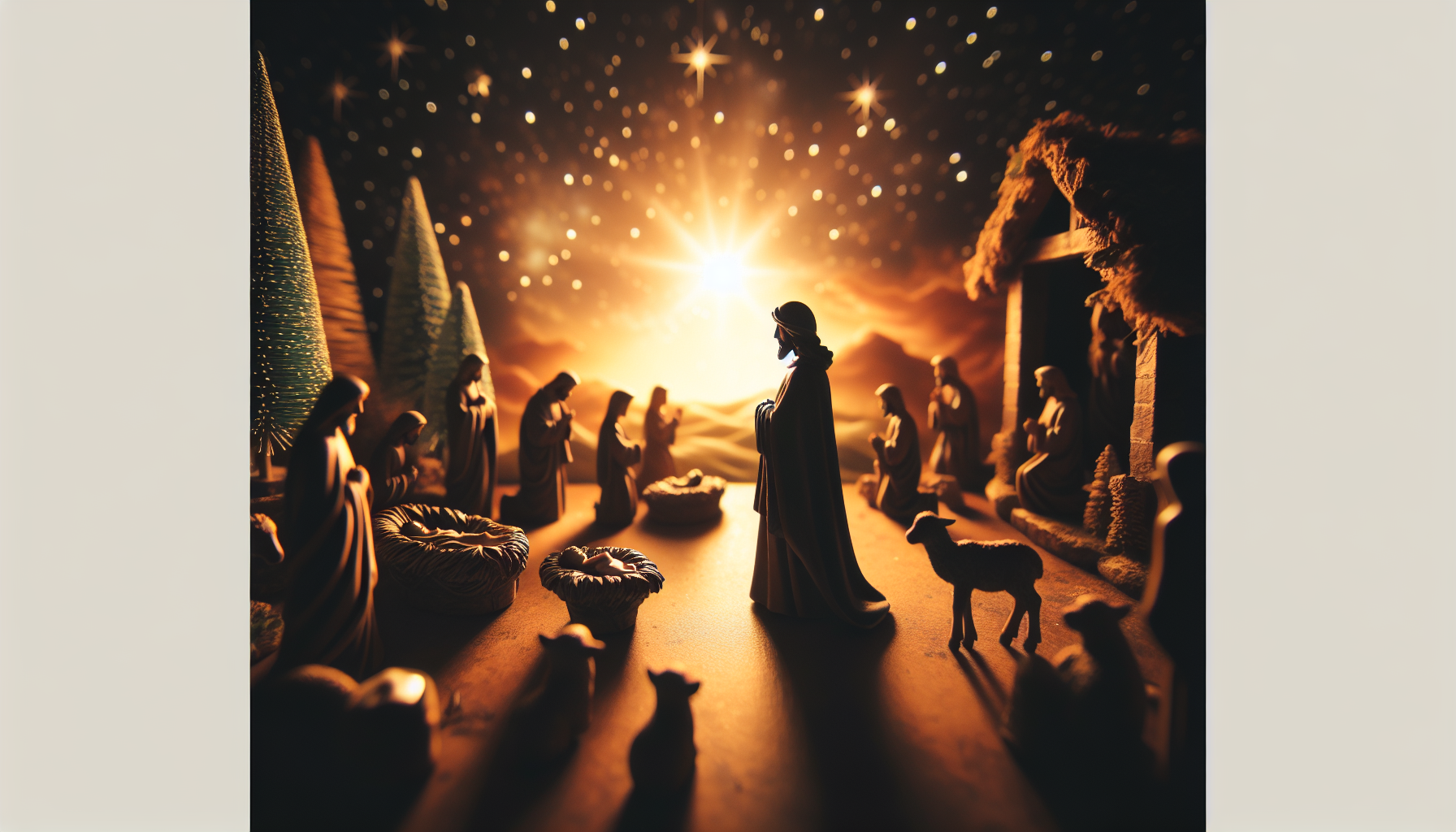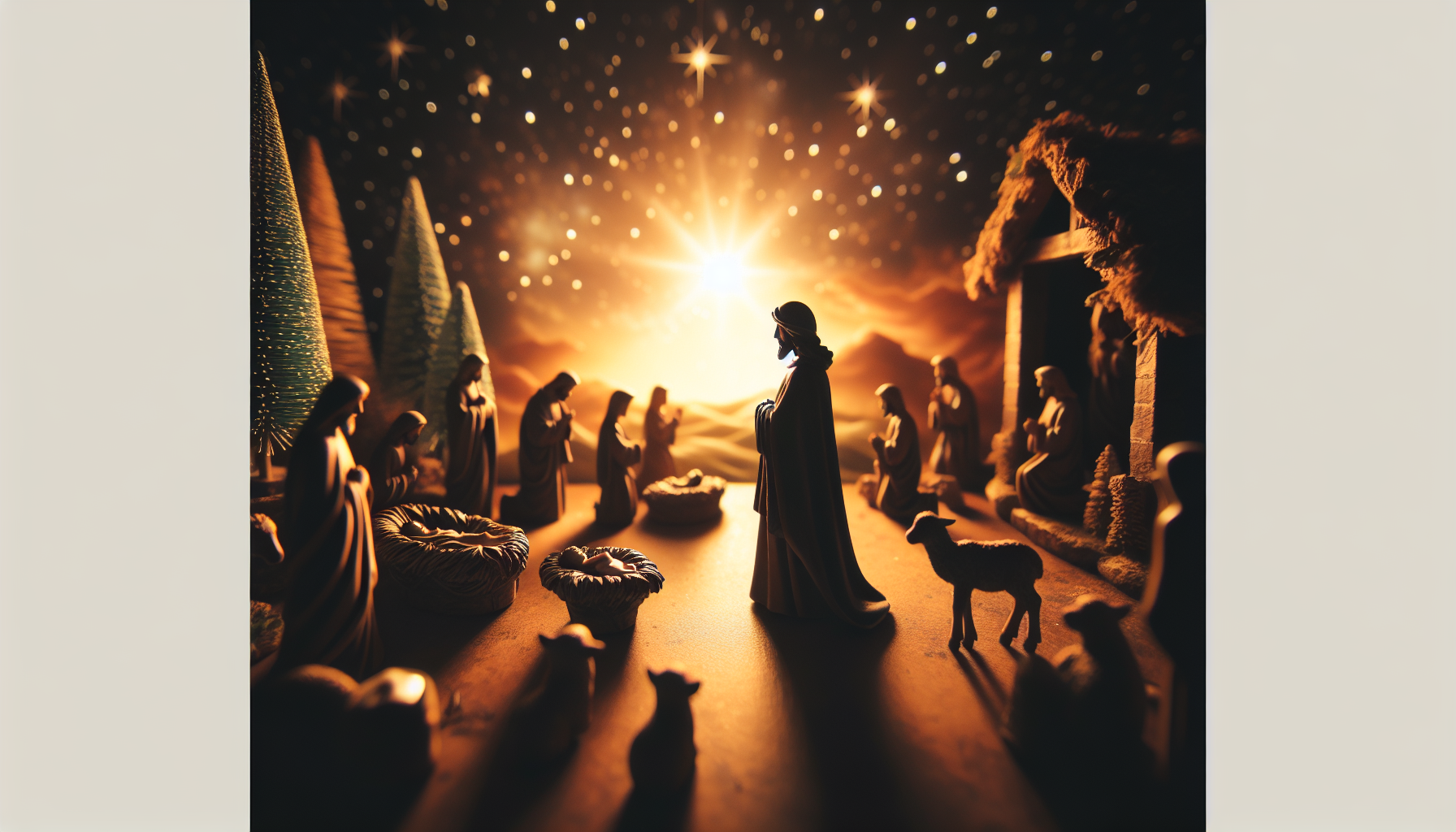Imagine stepping into a world where miracles happen, where a sparkling star leads the way, and where a humble stable becomes the birthplace of hope. That world is the story of Christmas, a tale that has been passed down through the ages and continues to captivate hearts around the globe. The Nativity, the central event of this cherished narrative, holds a profound significance that goes beyond the joyous festivities. It is the story of a child who came to bring love, peace, and salvation to the world, reminding us of the power of faith and the enduring message of hope.

The Surrounding Historical Context
Roman rule in Palestine
During the time of the nativity, Palestine was under Roman rule. The Roman Empire, known for its vast territories and advanced governance, had a considerable influence on the political and cultural landscape of the region. The Roman government controlled many aspects of daily life, imposing taxes and enforcing their rule through military forces. This context is crucial in understanding the backdrop against which the birth of Jesus took place.
The political and religious landscape
Palestine, within the Roman Empire, was an intersection of various political and religious ideologies. The region witnessed a diverse mix of cultures, including Jewish, Roman, Greek, and other local traditions. The Jewish people, in particular, held a deep religious fervor and a strong sense of national identity. However, they were subject to Roman laws and authority. This environment created a tension between the Jewish people and the Roman rulers, which is essential in understanding the reactions to the birth of Jesus.
Expectations of a messiah
The Jewish people, living under Roman rule, had long nurtured the hope for a messiah—a savior who would deliver them from oppression. They anticipated the arrival of a divinely appointed figure who would restore their nation and establish a lasting reign of peace and justice. the nativity story of Jesus evoked this profound sense of anticipation, as many believed he could be the long-awaited messiah. These expectations added an extra layer of significance to the events surrounding his birth.
The Biblical Narrative of the Nativity
Narrative from the Book of Matthew
The Gospel of Matthew provides a detailed account of the nativity, focusing on Joseph’s perspective. It describes how Mary, already betrothed to Joseph, was found to be pregnant by the Holy Spirit. Initially troubled by this revelation, Joseph’s doubts were dispelled when an angel appeared to him in a dream, assuring him of Mary’s divine conception and instructing him to take her as his wife. The narrative then emphasizes the fulfillment of prophecies, the visit of the Magi, and the escape of the Holy Family to Egypt.
Narrative from the Book of Luke
The Gospel of Luke presents an alternate account of the nativity, shifting the focus to Mary. This narrative begins with the angel Gabriel appearing to Mary, announcing her miraculous conception and the significance of the child she would bear. Mary accepts her role humbly, offering her unconditional obedience to God’s plan. Luke includes a detailed description of Mary’s journey to Bethlehem with Joseph, the birth of Jesus in a manger, and the visitation of shepherds, who were informed of the Savior’s birth by a multitude of angels.
Mysteries and discrepancies in the narratives
While the Gospels of Matthew and Luke provide the primary accounts of the nativity, there are some discrepancies and unanswered questions that have intrigued theologians and historians for centuries. These mysteries include variations in the genealogies of Jesus, the specific details of the Magi and their visit, and the lack of mention of the nativity story in other biblical texts. Nevertheless, these variations do not diminish the central message and significance of the nativity.
The Role of Mary in the Nativity
Her acceptance of Immaculate Conception
Mary, chosen by God to be the mother of Jesus, played a pivotal role in the nativity. When the angel Gabriel appeared before her and revealed the divine plan, Mary’s response was one of unwavering faith and humility. She accepted the miraculous conception, fully surrendering herself to God’s will. Mary’s acceptance displayed her deep trust in God’s providence and her willingness to be a vessel for the salvation of humanity.
Her journey to Bethlehem
Mary’s journey to Bethlehem was a significant part of the nativity story. Due to a decree from the Roman Emperor Augustus, it was necessary for Joseph and Mary to travel to Bethlehem, Joseph’s ancestral home, for a census. While heavily pregnant, Mary endured the arduous journey from Nazareth to Bethlehem, a distance of approximately 80 miles. This journey underscored Mary’s determination, strength, and obedience to both Roman authority and God’s plan.
Her role as the mother of Jesus
Mary’s role as the mother of Jesus was a profound responsibility and an honor bestowed upon her by divine intervention. She was tasked with raising and nurturing the Son of God, guiding him in his earthly journey. Mary’s unconditional love, guidance, and maternal care were crucial in Jesus’ formative years. Her presence at the nativity symbolizes her crucial role within the story of salvation, and her unwavering support continued throughout Jesus’ ministry and ultimately to his crucifixion.
The Significance of Joseph
His lineage and its importance
Joseph, a descendant of King David, played a crucial role in the nativity story. His lineage connected Jesus to the messianic prophecies of the Old Testament, fulfilling the requirement for the messiah to be from the house of David. Joseph’s ancestral line established Jesus’ rightful place as the long-awaited savior.
His acceptance of Mary’s pregnancy
When Joseph discovered Mary’s pregnancy before their marriage, he initially planned to end their engagement quietly. However, after an angel appeared to him in a dream, Joseph accepted Mary’s miraculous conception as the will of God. His obedience and faith demonstrated his strength of character and his unwavering commitment to Mary, ultimately becoming the earthly father figure to Jesus.
His role as the earthly father of Jesus
Joseph, as Jesus’ earthly father, played an integral role in raising and protecting the Son of God. He provided for the physical and emotional well-being of Mary and Jesus, guiding them through the challenges they faced. Joseph’s role in Jesus’ life served as an example of obedience and humility, showcasing the importance of earthly fathers and their indispensable role in nurturing their children.

The Child, Jesus
Birthplace and its significance
Jesus’ birthplace, Bethlehem, holds great significance in the nativity story. Known as the City of David, Bethlehem was the birthplace of Israel’s most famous king. This connection to King David reinforced the messianic prophecies and positioned Jesus as the rightful heir to David’s throne. The humble setting of Jesus’ birth in a stable highlights God’s choice to enter the world and bring salvation to humanity in the midst of poverty and simplicity.
The manger and its symbolism
The manger, a feeding trough for animals, served as the makeshift cradle for baby Jesus. Its humble and lowly nature represents the meekness and humility with which Jesus entered the world. The manger symbolizes Jesus’ identification with the poor and marginalized and acts as a reminder of God’s love for all humanity, regardless of social status or worldly acclaim.
Jesus as the Son of God
At the core of the nativity story is the belief that Jesus is the Son of God, the long-awaited messiah. Christians regard Jesus’ birth as the incarnation of God’s divine nature into human form. The nativity represents the profound act of God’s love and grace, as He sent His Son into the world to reconcile humanity with Himself. Jesus’ birth signifies the hope of salvation and redemption for all people, emphasizing the transformative power of his life, death, and resurrection.
Significance of the Shepherds
First receivers of the Good news
The shepherds, humble and hardworking individuals, were the first to receive the angelic proclamation of Jesus’ birth. The angels appeared to them in the fields, informing them of the good news and guiding them to the stable in Bethlehem. The shepherds’ inclusion in the nativity story highlights God’s desire to invite everyone, regardless of their social status, into the joyous revelation of His love and grace.
Symbolizing the humbleness of Christ’s birth
The shepherds’ presence at the nativity symbolizes the humbleness and simplicity of Jesus’ birth. In a society where kings and rulers held high status, it was shepherds, often marginalized and overlooked, who were chosen to witness and celebrate the birth of the Savior. This symbolism reinforces the theme of God’s preference for the humble and His ability to work through the ordinary to accomplish extraordinary purposes.
Their role in sharing the message of Jesus’ birth
After witnessing the miraculous event, the shepherds became messengers of the good news of Jesus’ birth. They shared their firsthand experience with others, spreading the joy and hope that accompanied the arrival of the messiah. The shepherds not only played a significant role in the nativity story itself but also exemplified the responsibility of all believers to share the message of Jesus’ redemptive love throughout the world.

The Three Wise Men
Their journey following the star
The arrival of the wise men, referred to as the Magi or the Three Kings, adds a sense of wonder and awe to the nativity story. Guided by a miraculous star, these learned men embarked on a long and arduous journey to Bethlehem, in search of the newborn king. Their dedication to following the star exemplifies their faith and unwavering belief that they were witnessing a significant event in history.
The gifts they presented and their symbolic meanings
The wise men presented three gifts to the baby Jesus—gold, frankincense, and myrrh. Each gift held a symbolic meaning. Gold, a precious metal, represented Jesus’ kingship and royalty. Frankincense, a fragrant resin used in religious rituals, symbolized Jesus’ divinity and his role as a high priest. Lastly, myrrh, an embalming spice, foreshadowed Jesus’ sacrificial death and burial. These gifts represent the multifaceted nature of Jesus’ identity and purpose.
Their role in the prophecy of Jesus as the King of the Jews
The wise men’s arrival and their acknowledgment of Jesus as the King of the Jews further emphasized the messianic prophecies. Their recognition and homage to the newborn king validated the beliefs and expectations of the Jewish people. This acknowledgment by the wise men also foreshadowed Jesus’ universal kingship and the fulfillment of God’s promise to bless all nations through the descendant of Abraham.
Role of Angels in the Nativity Story
Announcement to Mary and Joseph
Angels played a vital role in the nativity story, delivering divine messages and guidance to key figures. The angel Gabriel appeared to both Mary and Joseph, revealing the miraculous conception and assuring them of God’s plan. These angelic announcements provided comfort, reassurance, and guidance, reminding Mary and Joseph of the great importance of their roles in the birth of Jesus.
Proclamation to the Shepherds
The angels proclaimed the good news of Jesus’ birth to the shepherds in the fields near Bethlehem. Their angelic chorus celebrated the arrival of the Savior, declaring peace and goodwill towards all people. The angelic proclamation not only captivated the shepherds but also serves as a reminder of God’s limitless love and His desire to bring hope and reconciliation to a broken world.
Protection of Jesus from King Herod’s decree
Following the visit of the wise men, an angelic warning prompted Joseph to flee to Egypt to protect Jesus from King Herod’s wrath. The angel ensured the safety and preservation of the infant Jesus, further highlighting the divine intervention and protection surrounding the nativity story. The role of angels in safeguarding Jesus from harm demonstrates God’s constant care and His commitment to fulfilling His redemptive plan.

The Significance of the Nativity to Christianity
Fulfillment of Old Testament prophecy
The nativity of Jesus fulfilled numerous prophecies from the Old Testament. From the virgin birth in Isaiah 7:14 to the birthplace of the Messiah in Micah 5:2, the events surrounding the nativity serve as tangible evidence of God’s faithfulness to His promises. The fulfillment of these prophecies provides believers with confidence in the authenticity and divine nature of Jesus’ identity as the long-awaited messiah.
Manifestation of God’s love through Jesus Christ
The nativity story exemplifies the immense love of God as He enters the world in the form of a vulnerable infant. The act of God sending His Son demonstrates His willingness to bridge the gap between humanity and Himself, providing a pathway to salvation. God’s love, embodied in the person of Jesus Christ, continues to be a central tenet of Christianity, offering believers the hope of eternal life and the restoration of a broken relationship with God.
Introduction of salvation to the world
The nativity of Jesus represents the pivotal moment in human history when salvation is introduced to the world. Through Jesus’ birth, life, death, and resurrection, humanity is given the opportunity to be reconciled with God and experience the forgiveness of sins. The significance of the nativity extends beyond a simple historical event, as it signifies the beginning of God’s redemptive plan for humanity and the initiation of a new covenant between God and His people.
The Celebration of Christmas
Origins and evolution of Christmas celebrations
The celebration of Christmas has evolved over the centuries, drawing inspiration from various cultural and religious practices. Early Christian communities initially focused on the theological significance of Jesus’ birth, prioritizing prayer, worship, and reflection. However, Christmas celebrations gradually incorporated elements from pagan winter festivals, such as Saturnalia and Yule, as a way to contextualize and make the Christian message more accessible. These influences have shaped the modern traditions associated with Christmas.
Influence on culture and traditions worldwide
Christmas has become a global celebration, influencing cultures and traditions across the globe. The exchange of gifts, the decoration of Christmas trees, the singing of carols, and the gathering of family and friends have become ubiquitous customs associated with the holiday. The universal appeal of Christmas speaks to its ability to transcend religious boundaries and carry a message of love, peace, and unity that resonates with people of diverse backgrounds.
Spiritual implications amongst Christians
For Christians, the celebration of Christmas holds deep spiritual significance. It serves as a reminder of God’s immense love and the incredible gift of Jesus Christ. The festivities provide an opportunity for believers to reflect on the profound message of salvation, to renew their faith, and to express gratitude for the hope and joy brought into the world by Jesus’ birth. The spiritual implications of Christmas extend beyond the commemoration of a historical event, inviting believers to embrace the transformative power of Christ’s presence in their lives.


